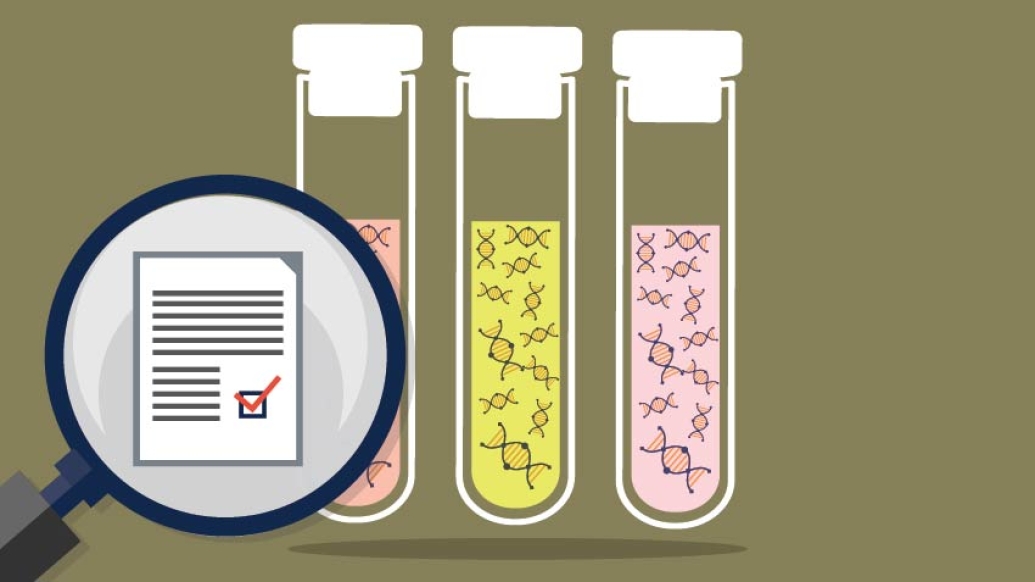Some genetic mutations linked to breast cancer also can affect men, but in a different way. A Michigan Medicine urologist explains the connection.
7:00 AM
Author |

Thanks to Angelina Jolie and Christina Applegate, many of us are now aware that women with certain hereditary genetic mutations have an increased risk of breast cancer.
MORE FROM MICHIGAN: Sign up for our weekly newsletter
What you might not know, though, is that some of those same genetic mutations — and a handful of others — are linked to aggressive prostate cancer in men.
Doctors are seeing more advanced cases of prostate cancer in recent years, and in younger men. After the 2012 U.S. Preventive Services Task Force recommendation to discontinue prostate-specific antigen (PSA) testing in all men, men are being tested for prostate cancer at a later age and less frequently.
While the change in PSA screening means fewer men are receiving unnecessary treatment, others might have less of an opportunity to catch aggressive cancer at an early stage. That's why it's important for men who may have a greater chance of developing prostate cancer to identify if they have an inherited genetic mutation that could lead to prostate cancer.
Michigan Medicine urological surgeon Todd Morgan, M.D., has launched the Prostate Cancer Risk Clinic — the first of its kind in the country — to help men with genetic predisposition to prostate cancer identify and monitor their risk of the disease.
Morgan spoke recently about what all men need to know.
Is there a connection between hereditary risk of breast cancer and the risk of prostate cancer?
Morgan: Yes. Let's say a woman has a strong family history of breast cancer, so she gets tested and finds out that she has a BRCA2 mutation. We have a very robust high-risk breast cancer clinic for that woman, providing counseling around her cancer risk, detection strategies and options for cancer prevention.
That's something people have known for years — BRCA1 and BRCA2 predispose to breast cancer. Once a woman has identified that she has the mutation, she will need very careful screening under the care of some type of clinic like we have here. That woman's sister would likely also go in for genetic testing at this point to find out if she, too, is at risk.
SEE ALSO: Should You Have PSA Screening for Prostate Cancer?
Here's the problem, though: Her brother historically might not necessarily be tested because BRCA1 and BRCA2 have always been linked to breast cancer. Although men do occasionally get diagnosed with breast cancer, it's pretty rare.
But more and more people are realizing that BRCA mutations predispose to other cancers that impact men, like prostate cancer. And, in fact, it's not just that they'll be predisposed to prostate cancer: BRCA2 mutations predispose to a more aggressive type of prostate cancer, but these cancers also may be more responsive to certain types of therapies.
And so that man might get referred from that high-risk breast clinic to a genetics clinic here, where he can get tested for that mutation. If it is determined that he shares the same genetic mutation as his sister, he should begin very careful screening.
Are there other genetic mutations that put men at a higher risk for prostate cancer?
Morgan: Another example would be Lynch syndrome, which predisposes to colorectal cancer as well as several other cancers. Over the last 10 years, we've realized that men with one of the mutations that predisposes to Lynch syndrome are also predisposed to aggressive prostate cancer. But the word hasn't really gotten out.
Other genetic mutations that appear to put men at higher risk for prostate cancer include Li-Fraumeni syndrome (p53), ATM, PALB2, CHEK2, RAD51D, ATR, NBN, GEN1, RAD51C, MRE11A, BRIP1 and FAM175A.
Why is it important for men with a family history to be tested for genetic mutations?
Morgan: Primary care doctors are no longer consistently recommending routine prostate cancer screening to their patients, which seems to be sending the message that men don't need to worry about prostate cancer.
The reality is that prostate cancer is the second-leading cause of cancer deaths in men in the United States. Men who have inherited mutations are much more likely to have aggressive prostate cancer. We know that treatment of aggressive prostate cancer works and prevents death and suffering from prostate cancer. That's what this is about more than anything else: preventing death and suffering from prostate cancer.
For more information on the Prostate Cancer Risk Clinic, call the Cancer AnswerLine at 800-865-1125.

Explore a variety of healthcare news & stories by visiting the Health Lab home page for more articles.

Department of Communication at Michigan Medicine
Want top health & research news weekly? Sign up for Health Lab’s newsletters today!





